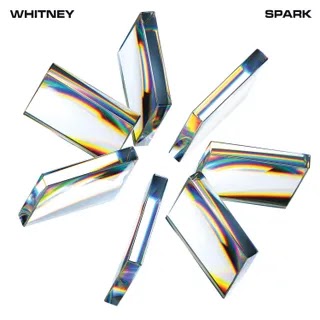The Chicago duo’s inert new album has a gorgeous sound, but it comes at the cost of depth and spontaneity.
The Chicago duo Whitney made a bracing first impression with “No Woman,” the lead single from their 2016 debut, Light Upon the Lake. Over a spare, eerie folk arrangement, singer-drummer Julien Ehrlich sang almost entirely through his nose—the Bonnie “Prince”-Billie Holiday vibe he created with guitarist Max Kakacek was intriguing and strange, but then he found the plumb line where his chest voice, already high, met his rangy falsetto. That’s where he has hovered ever since, dabbing cirrus wisps on an evolving musical backdrop.
In the last seven years, Whitney’s ethereal indie-folk has filled out with strains of soft rock, smooth jazz, country rock, feel-good soul, and other staples of throwback FM radio; the more contemporary R&B influences that became evident later are now plain to see. Spark, their fourth album (counting the covers one), calls their debut to mind when a feline cast steals over Ehrlich’s voice for the sauntering ocean-liner soul of the first song, “Nothing Remains”—and then this vocal eccentricity swiftly fades, making way for the multi-tracked lacquer that coats most of the record. Spark has a gorgeous finish, but it seems to have come at the cost of depth and spontaneity.
The album was produced by Brad Cook and John Congleton, who shape a crisp, supple surface and a gooey, waist-deep low end from a palette of strings, synthesizers, and horns. The latter two are cunningly bridged via an EVI, which allows a synth to be played like a trumpet. The live ensemble adroitly coils through sturdy, refined drum and sample programming, and the album seems to have ample variety: There are the churchy Prince pastiches, like “Blue”; the dreamlike Bon Iver voicescapes, like “Twirl”; and disco macarons that taste of Hot Chip or Jamie Lidell (“Memory” is a highlight, with that little techno arpeggio picked out on a palm-muted guitar).
So it’s hard to pin down why Spark can feel so momentary, inert, or even monotonous. There is a tendency toward slow tempos, which is accentuated by Ehrlich’s deliberate, pausing pace, as if each line were written on a separate scroll that had to be ceremoniously unfurled. And the lyrics, it must be said, don’t stand up to such careful scrutiny. Favoring the handiest why-sky rhymes when they bother with rhyming at all, they have little narrative shape or specificity, and the phrases are bland to an extent that seems willful, heavy with emotion but light on meaning.
Most of all, there just isn’t quite enough to some of these songs for them to stick. A couple of compact hooks repeating for a few minutes might sound fetching without adding up to much, and songs like “Back Then” give away all their moves too soon, then repeat them for a little while. Even the unruly bass-and-piano groove of “Real Love” is quickly tamed into the record’s sweet, solemn patina as Ehrlich sings the same run on the word “love” over and over like a human sample. (Also, it takes guts to call a ’90s R&B homage “Real Love” if you’re not Mary J. Blige.)
Still, there is something about Whitney that you want to like. Perhaps it’s that their music is so eager to please, so familiar, so keen to plump up a cushion for you. But there’s a fine line between grace and ingratiation. Besides that mewling beginning and one refreshingly unadorned passage in “Self,” Ehrlich’s voice is blended smooth as vanilla pudding without respite, losing more in expressive range than it gains in expressive impact. Someone (let’s not get into who) once quipped that Wagner’s music was better than it sounded, and perhaps Whitney’s music is starting to sound better than it is. A little more songwriting, and a bit more leeway for that old, bracing strangeness, would go a long way.



0 comments:
Post a Comment